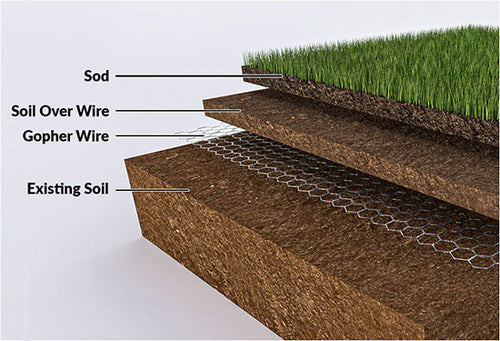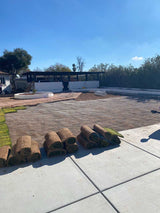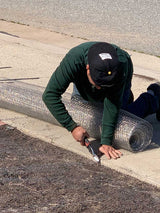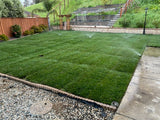20 Gauge Chicken Wire
FREE SHIPPING
The 20 gauge chicken wire ships from our UT warehouse.
The installation of Gopher Block® is straight forward and can be installed by a homeowner or landscape contractor.
Install Guide: Download PDF

Fast Shipping
(orders to California are delivered in approximately 2-3 business days)
Gopher Block® orders typically are shipped within 1 business day. Smaller orders (less than 5 rolls) ship via UPS/Fedex and larger orders ship LTL freight. If your delivery is by LTL freight, the freight company will call to schedule a delivery appointment.

Each roll of Gopher Block® requires 100 ground staples for proper installation. (sold separately).
Visit our Project Gallery to view a wide variety of different Gopher Block® installations by our customers.



Although Gopher Block® is not specifically designed to prevent mole intrusion, we have had customers that have installed it for this application and the gopher wire has proved effective at deterring moles from tunneling into landscape and lawn areas.
"After tilling and clearing the loam from our yard, I installed the gopher wire roll. I then applied another 6 inches of topsoil/compost and then laid 1,800 square feet of zeon zoysia sod. The gopher wire roll is an incredible product and in my mind worth every penny. I have already seen the results. There is an adjacent section where our yard meets the neighbors yard. Given the frequent watering/worms, etc. our yard has become an attractive site for moles. Well, our yard has been perfectly protected from the moles, and our neighbors yard is full of new holes and tunnels. They just cannot seem to penetrate the wire roll. The quality is also impressive. Does not even compare to the junk available at “unnamed big box” hardware store (trust me, I looked!) Anyway, here are several photos of the installation process and the final product. "
-
Colin R.
Austin, TX



If you are just starting off raising chickens or you are in the process of upgrading your chicken coops, choosing the right netting is very important. Finding and getting the right netting is not exactly an easy feat. There are literally hundreds of options available to you with each offering their own specific pros and cons.
The good news, with some knowledge and some great tips, you can find just what you need for your coops without sacrificing quality or paying far too much for them. We are going to provide you with great information and instructions for selecting, installing, and caring for your chicken coop netting. So let's get started.

Attaching Chicken Wire to Coop
Selecting the right netting for your coop involves several factors you have to take into consideration.
Things You Must Know About Your Coop:
• The shape and size of the coop area
• How many chickens do you have
• Know the different types of predators and pests in your area
• Know your budget
To date, there are many more netting options available for you. You need to know how to meet the needs of your chickens, the kind of coop, and its location in order to select what will work best for you.
There are different options to choose from including electric fencing, chain link netting, or chicken wire.
Realize, that there are several predators in the air such as eagles, owls, and hawks that will attack and kill your chickens if the opportunity arises. That said, there are solutions to keep your chickens safe. Bird netting is an excellent choice and should be a must-have addition to your chicken coop. Read on for more information and benefits.
One of the best benefits of an aviary net is the level of protection it provides. A study published in 2020 showed that during egg production almost 4% of hens in free-range and organic flocks fall victim to predators, especially buzzards and northern goshawks. The financial consequences range from 5700 to 6700 EUR per flock. Installing aviary netting should not be overlooked.
One benefit of having high-quality netting for your chicken coop is creating a good environment for your chickens whether you have an organic farm or raising chickens as pets. Installing a larger coop, your chickens can roam around safely, have access to fresh air, clean water, and fresh food.

Chickens in Coop
If you decide to build a custom coop or have one created for you, you will meet the needs of your chickens while dealing with various limitations in your area. You do not have to cut back for safety, just use the right fencing such as bird netting. You can create an enclosure that will protect your chickens on all sides even if you have created a coop that has a unique shape.
If you get the right amount of bird netting, you can keep your chickens safe both day and night. On top of peace of mind, you will save a good deal of money.
Your chickens will have access to fruits, grass, and vegetables which will save you money on feed. Also, you will not have to worry about losing any of your pets to predators because your chickens will remain well-protected.

Garden Area with Chicken Coop
Now that you understand the benefits of netting for your chicken coop and have chosen the netting you will need, you should contact a specialized professional for added advice. It's time to read up on the following tips for installing netting before you get started.
Take your time evaluating and planning the design you want for your coop. Write down the measurements and then purchase the amount of netting that will be needed. Prepare the area by removing any obstacles such as overhanging branches from trees. Install either wooden or metal posts or vertical support making sure they are at a good distance from each other. Attach the netting to posts and stretch it so it will be taut no matter what weather conditions pop up. Use poultry staples and cable ties to secure the netting.
Dig and place the lower section of the netting into the ground to prevent predators from getting in and then install overhead coverage. Once the coop is done, look around to make sure there are no signs of damage or poor installations that should be corrected. Later on, there will be time to make any improvements or upgrades to the coop.
Netting plays a critical role in keeping predators out including large animals, burrowing animals, and birds. The proper netting will help you protect your chickens from bears and wolves that can be a threat in remote areas. Also, overhead coverage will protect your chickens from serious weather conditions such as heavy snow, hail, and extreme sunlight. Carefully evaluate the location and position of the coop to make sure the netting is working properly to keep your chickens safe.
You will have several options when choosing the right bird netting for your chicken coop including:
Standard Chicken Wire – This is the most common and affordable material to enclose your chicken coop. This chicken wire is also known as poultry wire. It's normally made from galvanized steel and knotted to create hexagonal gaps. This netting offers protection against raccoons and foxes and is suitable for most kinds of coops.
Hardware Cloth – This kind of netting is made of galvanized stainless steel and braided to create rectangles or squares. It's more resistant than standard chicken wire and is better at protecting against small predators that can fit through larger-gauge wire.
Aviary Netting – This netting will enclose the coop from all sides to protect your chicken against flying predators like birds of prey.
Electric Poultry Netting – If you have issues with predators, you should consider using electric netting. Even though it's usually more expensive and requires more maintenance and upkeep, it will effectively deter predators and other animals and might outlast standard fencing.
Other alternatives include plastic safety netting which should only be a choice if you if you do not have problems with predators. Chain link chicken fencing should be your chosen product if you are dealing with predators like bears.

Chickens In Fenced in Area

Chicken Coop in Large Field
No matter what, your chicken coop must be cleaned regularly. The good news, if you have chosen high-quality materials and followed proper installation practices, it won't become a chore. To keep your coop in great shape with regular inspections for signs of damage or wear and tear to the netting.
Use mild or natural detergents to clean the netting so you won't harm your chickens. Keep an eye out for rust spots and clean them as soon as you find them. Also, be aware of water and moisture damage. Also, stay on top of any loose ends and secure areas that have become loose or damaged allowing predators to get in.